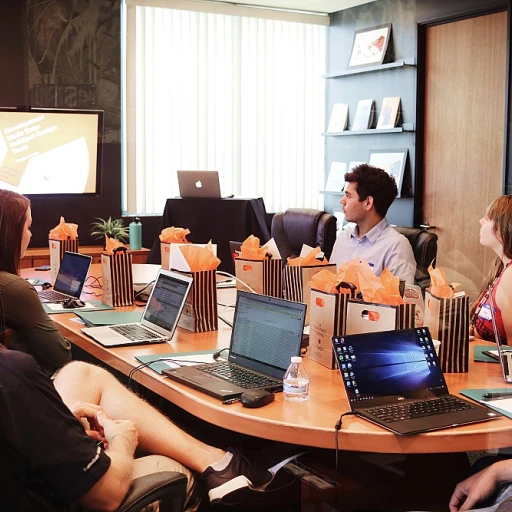
Understanding Succession Planning
Demystifying Succession Planning
Succession planning is a strategic process aimed at ensuring that an organization recruits and develops employees to fill key roles in the future. Recently, this has become essential for maintaining operational continuity and fostering leadership growth. Though some might view it as a complex task, breaking down its components unveils actionable strategies. Effective succession planning balances the experience and skills of existing employees with the potential of newer members such as college students and recent graduates. Organizations today are increasingly relying on learning consultants to guide them through this process. These experts bring valuable insights from the field of human resources and learning development. They utilize data-driven approaches and social media analytics to identify rising talents and to predict future workplace trends. By implementing a mix of full-time and online training strategies, they help in refining the skills of undergraduate students and experienced workers alike. Key components of a successful succession plan include:- Identifying talent: Through consistent evaluation and assessments, organizations can pinpoint positions that are crucial to continued success.
- Training program development: Creating bespoke training modules and learning strategies that align with overall business goals.
- Monitoring and adjusting plans: Utilizing feedback and analytics to assess the effectiveness of training and development initiatives.
The Role of a Learning Consultant
Understanding the Impact of Learning Consultants
In the intricate world of succession planning, the role of a learning consultant is pivotal. These professionals are not just facilitators of training programs; they are architects of growth and development within an organization. Their key responsibilities involve crafting learning strategies that align with the company's long-term goals and ensuring that the talent pool is ready to step into leadership roles when the time comes.
Learning consultants bring a wealth of experience in instructional design and content creation. They work closely with management to identify the skills needed for future leaders and develop tailored training programs to address these needs. This includes designing both online training and in-person sessions that cater to the diverse learning styles of employees.
Collaborating with Management and Employees
Effective succession planning requires a collaborative approach. Learning consultants often act as intermediaries between management and employees, ensuring that the training content is relevant and impactful. They leverage social media and other digital platforms to enhance engagement and make learning more accessible. By establishing strong campus connections and fostering a culture of continuous learning, consultants help create an environment where employees feel motivated to grow.
Additionally, consultants play a crucial role in identifying key positions within the organization that require succession planning. They work alongside HR to pinpoint high-potential employees and provide them with the necessary professional development opportunities. This proactive approach ensures that the organization is not caught off guard by unexpected vacancies.
Facilitating Development Programs
Learning consultants are instrumental in developing and implementing training development programs that are both comprehensive and adaptable. These programs are designed to build leadership skills and prepare employees for more significant roles. By focusing on presentation skills, decision-making, and strategic thinking, consultants ensure that potential leaders are well-equipped to handle the challenges of their future roles.
Moreover, learning consultants often engage with college students and undergraduate students through internships and workshops, preparing them for future roles within the organization. This early engagement helps build a pipeline of talent that can be nurtured over time.
For more insights on crafting effective interview questions for succession planning, you can explore this resource.
Identifying Key Positions and Talent
Spotting Future Leaders: A Strategic Approach
Identifying key positions and talent is a cornerstone of effective succession planning. This crucial step ensures the continuity and success of an organization, making it vital to recognize those individuals who exhibit the potential to step into leadership roles. A learning consultant plays a significant role by implementing structured learning and training programs designed to surface these future leaders.
The process of identifying talent involves a comprehensive evaluation of current employees, understanding their skills, experience, and overall potential for growth. A consultant's insights, gained through extensive work with various training programs and instructional design, can be instrumental in highlighting the strengths and skills of potential candidates.
Utilizing a Multifaceted Training Approach
Learning consultants leverage a variety of learning strategies and tools to identify potential leaders. This includes tactics like:
- Analyzing performance data and feedback from managers and peers
- Administering skill assessments and personality tests
- Observing employees in real-time through hands-on projects and presentations
- Facilitating discussions and workshops to encourage self-discovery among employees
Additionally, social media and online training hubs offer valuable platforms for organizational learning and visibility into employee interactions. Through these channels, learning consultants can assess how individuals take initiative, contribute to discussions, and display problem-solving skills.
Connecting with Campus Talent
Beyond the organization's existing staff, consultants also explore talent pipelines from colleges and universities. Engaging with undergraduate students and recent graduates can be a game-changer. Structured internship programs or campus recruitment initiatives foster campus connections and allow organizations to evaluate potential leaders while they are still students.
Such programs also enhance an organization's brand presence on campus, attracting top talents interested in professional development opportunities. By nurturing these connections over time, a company can cultivate a roster of potential leaders well-versed in the company's culture and values.
The goal is to create a pool of candidates who can step into leadership roles as needed. A learning development strategy that carefully curates the professional growth of identified talents ensures that when the time comes, these candidates possess the necessary skills and confidence to lead successfully.
Developing Leadership Skills
Building Future Leaders Through Skill Development
In the realm of succession planning, developing leadership skills is a cornerstone. This process not only ensures a smooth transition when key positions become vacant but also strengthens the overall capacity of an organization. A learning consultant plays a pivotal role in this aspect, leveraging their expertise to craft tailored learning strategies that align with organizational goals.
Leadership development is not a one-size-fits-all endeavor. It requires a nuanced approach that considers the unique needs of each potential leader. Learning consultants often design training programs that incorporate a mix of online training, campus connections, and social media engagement to create a comprehensive learning experience. These programs are crafted to enhance presentation skills, instructional design, and other essential competencies.
Integrating Learning Strategies
Effective learning strategies are integral to leadership development. Consultants work closely with organizations to identify the skills necessary for future leaders. This involves a detailed analysis of current roles and the competencies required for advancement. By doing so, they ensure that training content is relevant and impactful.
Moreover, learning consultants focus on creating a culture of continuous learning within the organization. This involves encouraging professional development and fostering an environment where college students and undergraduate students can thrive. The goal is to prepare these students for future leadership roles, ensuring a steady pipeline of talent ready to step up when needed.
Implementing a Tailored Training Program
Once the necessary skills and competencies have been identified, the next step is to implement a training program. This program should be dynamic, allowing for adjustments as the needs of the organization evolve. Learning consultants often employ content creation techniques to keep the material fresh and engaging, ensuring that it resonates with participants.
Additionally, the role of a learning consultant extends beyond just program development. They are also involved in learning consultation and training development, providing ongoing support to ensure the program's success. This might include regular check-ins, feedback sessions, and adjustments to the training content based on participant feedback and organizational changes.
In conclusion, developing leadership skills is a critical component of succession planning. With the guidance of a skilled learning consultant, organizations can create robust training programs that not only prepare individuals for future roles but also contribute to the long-term success of the organization.
Implementing a Succession Plan
Bringing Succession Strategies to Life
Making an effective succession plan a reality requires both focus and dedication. The role of a learning consultant becomes paramount at this stage, as their key responsibilities include designing and implementing training programs that address the specific needs of the organization. These can be tailored to enhance the essential leadership skills identified in earlier stages. A structured training program, incorporating learning development and practical on-the-job experiences, is critical. Learning consultants craft content that not only aligns with the leadership skills needed but also leverages methods like instructional design and online training to ensure wide access and engagement. By integrating tools such as social media and online campuses, a learning consultant can create an inclusive learning environment for employees, accommodating various learning preferences. Time management is crucial in this process. The timelines for training development must align with the organization's long-term goals, while also allowing managers to receive continuous support. This continuous improvement ensures that future leaders not only acquire skills but also adapt to evolving organizational demands. Regular assessments should be integrated within the program to measure skill acquisition and development progress. Learning resources might include professional development workshops or seminars that build on existing knowledge. Importantly, college students and other newcomers should be aligned with seasoned professionals in consulting roles, facilitating mentorships that enrich the learning experience. A successful implementation will rely on the consultation expertise to fine-tune programs as needed, addressing any gaps in content creation and delivery. Ultimately, the collective effort of learning consultants, managers, and the organization supports a seamless transition towards sustaining leadership and operational continuity.Measuring Success and Adjusting Plans
Evaluating the Effectiveness of Your Succession Strategy
As you move forward with your succession planning, it's crucial to assess the effectiveness of your strategies. This involves not just measuring outcomes but also adjusting your plans based on real-world results. Evaluating the success of your succession plan ensures that your organization remains agile and prepared for future challenges.
Key Metrics for Success
To measure the success of your succession plan, consider the following metrics:
- Leadership Readiness: Assess how well your leadership candidates are prepared to take on new roles. This involves evaluating their skills, experience, and the effectiveness of your training programs.
- Employee Retention: Monitor retention rates of those involved in the succession plan. High turnover may indicate gaps in development or engagement strategies.
- Performance Improvements: Track performance metrics of individuals who have undergone development programs. Improvements can signal the effectiveness of your learning strategies.
- Feedback from Participants: Collect feedback from those involved in the succession process, including learning consultants, managers, and the candidates themselves. Their insights can provide valuable information for refining your plan.
Adjusting Plans for Continuous Improvement
Once you've gathered data, it's time to adjust your succession plan. This might involve tweaking your learning development programs or modifying the key responsibilities of a learning consultant. Flexibility is vital; the business landscape and organizational needs are constantly evolving, and your succession plan should reflect this dynamism.
Consider the role of ongoing professional development and training. A learning consultant can help tailor programs to meet the unique needs of your organization. Whether through online training or campus connections, continuous learning ensures that your team remains at the forefront of industry standards.
Leveraging Technology and Social Media
Incorporate technology and social media to enhance your succession planning efforts. Online training platforms and social media can provide innovative ways to engage employees and foster a culture of continuous learning. This approach not only supports the development of future leaders but also strengthens the overall organizational culture.
Remember, succession planning is not a one-time event but a continuous process. By measuring success and making necessary adjustments, you ensure that your organization is well-equipped to face future challenges and seize opportunities.













